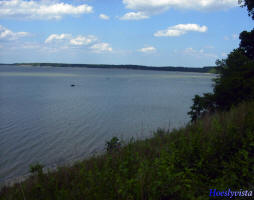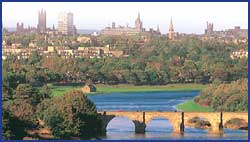 Development of cost-effective reclamation technologies for domestic wastewater and the appropriate agricultural use of the treated effluent under semi- arid climate conditions
Development of cost-effective reclamation technologies for domestic wastewater and the appropriate agricultural use of the treated effluent under semi- arid climate conditions
- Domestic wastewater is more and more regarded as an important water
resource in particularly arid climate areas. Development of cost-effective
reclamation techniques will stimulate the usage of this potential resource.
CORETECH is aiming to develop such techniques, making a direct link between
wastewater treatment and agricultural production, and in the mean time
studying the impact of the water quality on the agricultural production
systems (including soil and health risks).
- The core technology for BOD removal will consist of an anaerobic
treatment step avoiding any energy demand. This will be followed by
appropriate post-treatment for meeting reuse criteria. Based on the effluent
criteria, the most suitable water distribution/irrigation system will be
researched coupled to agricultural production systems.
-In addition, a bottom-up approach will be followed in which the
agricultural demand sets the effluent criteria and, consequently, the
specifications for the treatment system. The advantage of the latter
approach is that a low-grade application (e.g. cotton production, trees, and
animal fodder) will require only a plain, low-cost technique.
| Project number | ICA3-CT-1999-10009 | ||
|---|---|---|---|
| Subject(s) | WATER DEMAND , no translation available , no translation available | ||
| Acronym | CORETECH | ||
| Geographical coverage | Greece, Ireland, Jordan, Netherlands, Palestine, Egypt | ||
| Budget (in €) | 895050 | ||
| Programme | INCO MED (FP5) | ||
| Objectives | - To integrate sanitary engineering with environmental and agricultural
engineering for a cost-effective optimisation and safe usage of the limited
water and nutrient resources in the region. 1. Development of the most suitable on-site and community on-site sanitation and treatment systems: i) separation of black and grey wastewater in areas where so far no, or limited, sanitary services are available and ii) the decentralised treatment of locally produced sewage in small treatment plants. 2. Development of appropriate irrigation / fertilisation methodologies coupled to the (community) on-site treatment systems. 3. Selection of the most suitable agricultural crops, including the cropping pattern, to be grown on the treated sewage, taking into consideration the pathogen, salt, and nutrient content of the treated effluent and the crops’ economic value. 4.To study the environmental impact of the usage of treated sewage on the soil and underground water reservoirs with regard to the fate of micro pollutants. - To assess and develop improved methods for the identification and enumeration of various kinds of pathogenic organisms. |
||
| Results |
1. A cost effective sanitation, treatment and reuse
strategy for (semi-) arid climates, particularly serving small communities,
rural areas and city sections employing urban agriculture. 2. Low-cost anaerobic technology for the treatment of black water and mixed sewage. 3. Appropriate post treatment systems for the removal of pathogens and removal or recovery of excess nutrients which are not needed in agriculture. - Analytical procedures for the detection of pathogenic organisms, such as E. Coli, Giardia, Cryptosporium... |
||
| Period | [10/03/2000 - 09/03/2003] | ||
 you are not logged in
you are not logged in





